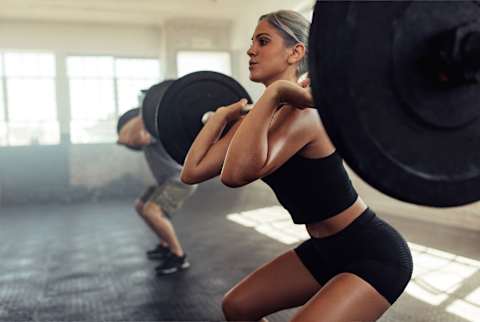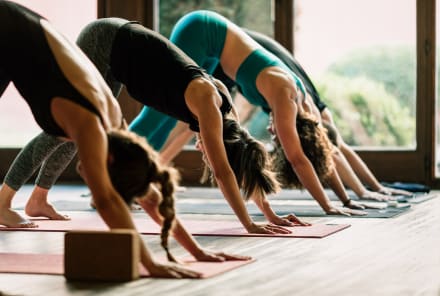Advertisement
How Athletes Deal With Body Image & What It Means For Beauty Standards Going Forward


For ages, the broader culture has encouraged women to think smaller—defining beauty by numbers on a scale and glamorizing the size double zero. And yet more recently, we’ve certainly seen a promising shift toward celebrating bigger bodies and more muscle—an exciting development in body diversity.
However, female athletes are placed at a unique intersection of demands: They are not immune to societal pressure to be as thin as possible, but their athletic performance will inherently be compromised if they let it run their lives.
If you want to be any good at your sport, be it gymnastics, basketball, tennis, or any other, you need muscle—and lots of it.
The teeter-totter between the two takes a toll on the mental health of young female athletes everywhere. Here’s what they had to say.
Meet the athletes
Sloane Stephens
American tennis player, champion of the 2017 U.S. Open, and founder of a new body care brand Doc + Glo.
Alice Merryweather
American downhill alpine skier, 2018 Olympian, and passionate mental health advocate.
Ilona Maher
Team USA rugby player, 2024 Paris Olympian, and TikTok influencer.
Defining beauty at a young age
We aren’t born to hate our bodies— it’s taught to us. So it makes sense that most of the time, negative body image sets in later in life, during the formative teenage years. In early life, beauty is defined by those around you.
“I grew up with an incredible beauty role model in my grandmother, Glo,” American professional tennis player Sloane Stephens says. “For her, beauty looked like feeling your best and doing your best for those around you,” she adds, telling me of her grandmother's simple yet consistent self-care routine she passed on to Stephens: Washing your face at night, putting on sunscreen in the morning, and showing your body respect through caring for it—as you would for another person you love.
This self care was not vain or artificial, but an investment in her body’s health in the future. ”Her deep sense of peace and belonging in your body and your future is, to me, beauty personified,” Stephens says.
"I learned beauty honestly through playing sports, and all of the people that I idolized as a kid were female athletes."
For Olympic alpine ski racer Alice Merryweather, strong women set the beauty standard when she was young. "I learned beauty honestly through playing sports, and all of the people that I idolized as a kid were female athletes."
Merryweather’s mom was a major sports supporter, so praising female athletes was a family affair from the start.
"That was how I developed my idea of what beauty was: it was being calm, being confident in your body, being able to move your body, being muscular, and for a long time, that was just automatic," she says.
When society's idea of beauty begins to filter in
But that tunnel vision view of wanting to look like the best female athletes didn’t last forever.
“As I started watching T.V. [and] got social media, I learned that social media and the rest of the world doesn't share that beauty standard—especially not 15 years ago or 20 years ago,” Merryweather explains.
As a teenager, Merryweather was exposed to more media that praised small, not strong, bodies.
“I remember watching America's Next Top Model religiously,” she says, referring to a popular early 2000s television series in which aspiring models compete to be the best in their class—while stressing about fitting a smaller size, having perfect skin, or the best runway walk.
These patterns repeated in society throughout Merryweather’s formative years, making her feel like she needed to care about what size clothes she wore and eliminate any fat on her body to be considered beautiful.
The contrasting images of muscular, powerful female athletes and the then-desired thigh gap and exposed ribcage made it challenging for her to understand what beauty truly meant, or more specifically, what kind of beautiful she, as a young girl, should strive to be.
"That became more and more confusing the older I got," she says.
Balancing performance and body image
Women in sports are not immune to being preoccupied with thoughts about “body standards,” even if they reject the typical "skinny is better" motto.
For example, each sport brings its own set of challenges regarding body image and the “ideal body” for that sport, adding to the confusion for both young and adult female athletes. Or the heightened focus on athlete’s bodies—from coaches, commentators, and fans alike—makes them hyper-aware of their appearance.
Self-conscious issues can also be entirely situational—an athlete may be confident about their powerful body while on the field, but less so in other circumstances.
Different sports, different standards
“There's this narrative that alpine girls do this gravity sport, and so we always eat dessert. We always go back for more food,” Merryweather says. With a gravity sport, the more weight you have on your side the better—directly conflicting what she learned from social media and television.
For a while, this empowered her and many of her teammates. Of course, I love dessert, of course, I’m going to go back and eat more, she would tell herself.
But over the years, this began chipping away at her body image in a different way, negatively impacting her sense of bodily autonomy. It clouded her idea of what she was comfortable with when it came to eating and exercise, altering her relationship with food entirely because of it.
In tennis, Stephens says, there’s an interesting layer to the standards set for physical appearance: “I think that's pretty unique to have a sport where the fashion is discussed alongside the performance,” she says.
These days, every player has their own apparel deals and their own sense of style. This can be empowering for some women, getting to express themselves through clothing, but a unique pressure put on others to not only play the sport well but look fashionable while doing so.
Athletes are subject to relentless comments about appearance
The spotlight on women’s sports in recent years is great—but the spotlight on women’s bodies isn’t so.
“It's been really cool to watch women's sports get so much more popular over the last few years and people are finally really paying attention. But oftentimes, a lot of the conversation still ends up being about these women's bodies, and it's less about what they can do,” Merryweather says.
“It's been really cool to watch women's sports get so much more popular over the last few years and people are finally really paying attention. But oftentimes, a lot of the conversation still ends up being about these women's bodies, and it's less about what they can do."
She stresses that even comments like, “Her muscles are so big,” or “She looks so dense,” might be spoken with sincere intent but isn’t always taken as such by the athlete.
Stephens experienced this out-of-context commenting on her own body at a unique time.
“When I froze my eggs in late 2022, I gained about 20 pounds during the retrieval process,” she says. “While I was really proud of myself for going through the egg retrieval cycle, since it was something I'd wanted to do for a while, people who didn't know all the details just assumed that I hadn't had as intense of an off-season training block when the reality couldn't have been further from the truth.”
Rather, commentators, coaches, and fans should stick with discussing the main topic at hand: The sport. It’s quite simple.
For some, this focus on physical health and food becomes too much
The comments from coaches and commentators: The pressure to be thin, but also muscular, and never sacrifice performance. The pressure to sometimes eat when you don’t want to, and sometimes not eat when you need to. The fact that each sport has an “ideal body type” for its best athletes. All of this can, without a doubt, become too much to bear.
For Merryweather, the pressure from all directions manifested into something far beyond negative self-talk.
“In 2020, I developed an eating disorder,” she says. At this point, Merryweather had been struggling with body image for a number of years already, but her relationship with food was hard to control when traveling for competitive skiing in Europe.
During the trip, she and her teammates stayed at hotels where the staff could cook meals for them, similar to typical tourist dishes.
“It was heavy, maybe unhealthy, food in some ways. It was also delicious and fueled my body in a way that I needed,” she says.
But the lack of control over what she was eating combined with the persistent messaging about societal body standards made her all the more critical of herself, often thinking: “‘How do I present myself as like the perfect athlete?’ And to me, that meant somehow trying to make my body fit societal norms, while also trying to compete at the highest level,” she relays.
“I started really restricting what I was eating and cut out a ton of foods and developed anorexia pretty seriously, really fast," she shares. "The eating disorder took over and pulled me down a path I couldn't get out of myself.”
When Merryweather did ski at the end of summer, after battling anorexia for months, she was three seconds behind teammates that she was usually equal to. “In ski racing, that’s a huge margin,” she says.
She realized that all of the food restrictions were not as healthy as she thought they were—they were causing her to whither away, lose strength, and struggle to keep up athletically.
Merryweather eventually asked for help, attending EDCare in Denver, where they have a healing program specifically tailored to athletes and the unique struggles they face.
Upon announcing her plans to take time off to recover from anorexia, Merryweather was met with floods of messages from teammates, competitors, and even strangers. They told her their own stories and what they were going through with sports, body image, and eating disorders. Merryweather quickly realized that she wasn’t alone at all, and in fact, eating disorders are extremely prevalent in women’s sports and often go undiagnosed.
Learning to love your body in every shape and form
The path to loving one's body is different for each one of us. For most, mindset is at the heart of true body acceptance and love.
Mindset is everything
For American rugby Olympian Ilona Maher, this mindset is twofold: “I don't feel bad about eating. I've been training my mind and training myself to [get to that mindset],” she said in a previous mindbodygreen Game On interview.
“I'm more about function versus form. Because right now, I'm supposed to be big. I'm supposed to be powerful. And I'm using these meals to do it,” Maher adds.
Nevertheless, she doesn’t pressure herself to reject femininity to be a successful rugby player, either. “I know that in our seventh circuit now, we have a lot of girls who put on a full face of makeup and who want to go out there and be pretty. I love that because I don't think you have to sacrifice that to play this traditionally very ‘manly’ sport.”
While being in the spotlight does take a toll on your self-esteem, Maher stands by the fact that sports can teach women to love their bodies, too. “Sports give your body a purpose that's not just to be looked at and objectified. I think sports give you an appreciation for your body,” she says.
Appreciate what your body does for you—and repay it with care
“As you grow into your body and develop your sense of self-worth, remember that health is a long-term commitment to yourself.”
Stephens offers advice to young women and female athletes everywhere: “As you grow into your body and develop your sense of self-worth, remember that health is a long-term commitment to yourself.”
She adds, “Ultimately, my body is the machine that I need in order to do my job, so part of my job is treating my body with love and respect.”
For Merryweather, a similar message rings true. “The number one thing for me is to appreciate what my body does for me.”
Remember that you shouldn’t look any particular way
Finally, Merryweather holds on to a mantra originally said by her partner—a simple, yet perfect way to shortcut her intrusive thoughts.
“When I was coming out of treatment, finding my own rhythm, starting to feel confident, and make my own food and workout decisions, I would still have moments where I was like, ‘No, I don’t look like an athlete,’ or ‘I don't look good enough to wear those clothes,’ and [my partner] just said: You shouldn’t look like anything.”
We need to make mental health a priority if we want to address body image in sports
Women’s sports are receiving more attention than ever before, but the care female athletes get behind the scenes needs to measure up.
“One of the best things that sports executives can do is to understand that mental health is intertwined with an individual's physical health, sports experience, and sports performance. Executives should allocate more resources to hire more mental health professionals to support athletes in the context of sports organizations or athletic departments,” sports psychologist Riley Nickols, Ph.D., CEDS-C, says.
This means not cutting corners.
Nickols adds, “Many Division I athletic departments have followed by increasing the number of mental health providers supporting athletes. However, it is not uncommon for a college to have 400-500 student-athletes and only a limited number of mental health providers (1-3).”
Merryweather suggests more coaches educate their players on the realities of sports, health, and body image—speaking openly about eating disorders of all kinds. In fact, she poses that eating disorder education and awareness should be more prevalent across the board—in sports and otherwise.
The consensus: We have hope
All of this said, it's heartwarming to look at how far we’ve come with women’s sports, mental health, and body image reckoning.
As Stephens says, “I'm really excited for the future and optimistic that young female athletes will enter a society with more open conversation and acceptance that our bodies are unique and that we don't have to hide or suppress our bodies for other people's expectations.”

These 6 Simple Steps Will Make The Age Of Aquarius Your Best Era Yet
Perpetua Neo, DClinPsy

These 6 Simple Steps Will Make The Age Of Aquarius Your Best Era Yet
Perpetua Neo, DClinPsy

These 6 Simple Steps Will Make The Age Of Aquarius Your Best Era Yet
Perpetua Neo, DClinPsy

These 6 Simple Steps Will Make The Age Of Aquarius Your Best Era Yet
Perpetua Neo, DClinPsy









